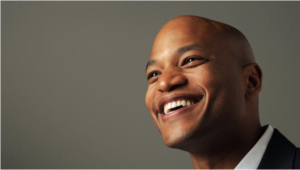By Jeremy Mauser || Contributing Writer

“The only way that I was going to succeed was if other people helped me, and the only way they would succeed was if I helped them.”
Prolific author and entrepreneur Wes Moore visited the Franklin & Marshall campus this past Thursday, September 13, to speak at Common Hour with the title, “The Other Wes Moore: One Name, Two Fates.” Moore spoke of important events that shaped his life and offered inspiration for those in attendance.
Many may know Moore for his work as an author. His debut novel, The Other Wes Moore, tells the story of two boys of the same name and same background who take completely different paths in life, with one becoming a scholar and the other facing a life sentence for murder.
Moore shared insight into the title of the bestseller at Common Hour, explaining that he initially thought that it was the “dumbest book title.” After he argued to the publishers that the story was not just about the two kids and that nobody even knows who the “original” Wes Moore is, they explained that the focus of the title was on “The Other.” There are “Wes Moores” in every community, and each is one decision away from taking a completely different path in life.
This relates to the charity work of Moore, who serves as the CEO of the Robin Hood Foundation, New York City’s largest poverty-fighting organization. And part of the organization’s initiative involves asking students what they do with their talent.
After asking the audience what it means to be talented, and how everyone should use their talents, Moore explained that talent is defined more by someone’s GPS than GPA. He argued that the direction in which people’s’ lives are going says more about their talent than the doctorate that they may earn and that the question “Who did you choose to stand up for when it wasn’t easy?” is more important than “What’s your major?”
Moore learned this from Harry Belafonte, the singer and social activist whom he met while making a guest appearance on the TV program “Morning Joe.” He told everyone at Common Hour that after asking Belafonte about why he always did what he felt was right, even when he knew not everyone would agree, the singer answered with a smile: “Because it’s more fun to live that way.” The speaker then urged everyone to stand up for what they believe is right, and that, “if you’re not doing it to be selfless, do it to be selfish.”
Moore also gave an extensive background on the events of his childhood that shaped his mentality and attitude. This includes his only two memories of his father—the first being when his father told him to never put his hands on a woman, and the second being when he watched his father die. Moore was four years old in both instances.
He and his family then moved from Baltimore to New York to live with his grandparents, and he got lost in the new setting. Moore explained that he was handcuffed for the first time while eleven years old, and that he hurt people who loved him.
His mother sent him to the Valley Forge Military Academy, but he did not understand the system and tried to run away five times. This included a sergeant handing him a fake map to the train station so that his commanding unit could laugh at him as he ran in the woods aimlessly.
But Moore learned an important lesson during a conversation he had with his mother over the phone while at Valley Forge. After he told her to take him away from the military school, she told him something that hit home:
“Too many people have sacrificed for you to be here. You have to understand it’s not all about you.”
A few years later, he and some football players started their own non-profit organization as college students after realizing that the organization they interned with did not help properly incarcerated kids with readjusting their lives. Moore then spoke to the audience about discovering their passions.
“If [an activity] is something that makes your heart beat a little bit faster, then go after it.”
To conclude his speech, Moore encouraged the student body to live interesting lives and work harder than ever before.
The audience rewarded the speaker with a standing ovation at the conclusion of his speech, but this was not the end of the hour. During the question-and-answer portion of the afternoon, he offered a final thought from his debut novel.
“We’re products of our expectations—not our environments.”
First-year Jeremy Mauser is a Contributing Writer. His email is jmauser@fandm.edu.